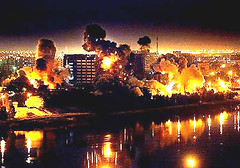Sunday, July 17, 2005
Beyond Karl Rove
It's a quiet, gloomy morning in Philly. Not much happening here. Unlike Iraq. I've resolved to let my blogsibs handle cleaning out the Rovian stable, an important work that they are doing just fine without my clueless interspersions.
I just wanted to talk about Iraq:
 The world is still out there.
The world is still out there.
Yglesias over at Tapped has picked up on the Robert Pape interview Juan Cole linked to last week, and it's good to see this piece getting some feet at a time when it seems people don't want to write or talk about anything except Karl Rove. Why?
Because while the Rove story is exciting and gives liberals an outside hope of bringing down the worst administration in American history (yes, I know how hyperbolic it sounds, but I stand by it), what is happening in Iraq and the motivations underlying that slaughter will have resonance for us far beyond the domestic mess Bushco have made.
Think of it: 27 children targeted and murdered; 87 dead and over 100 wounded Iraqs just yesterday; 29 dead and 111 wounded on Friday. These numbers are huge, and no one in the blogworld with the exception of some Mid-east wonks seems to be paying much attention. And in the background, thrumming along like a bassline to a threnody, the kidnappings of ordinary people go on. The implications for Americans (let alone Iraqis) are becoming enormous. As Cole noted yesterday, Philly Inquirer reporter Trudy Rubin recently returned from a visit to Iraq to report the American-trained Iraqi troops vastly unprepared to take on the protection of their own country (not even counting those that are in bed with the guerillas or too frightened and inimidated to be of much use). In the meantime, the longer these horrors go on, the longer the Iraqis have to mull over our inability to make them stop.
 We continue to mourn the London dead, but our media blithely throws off these growing numbers of newly-murdered Iraqis as though they were lottery numbers, to be posted out of necessity, but not to be dwelt on--this, too, is an ongoing source of bitterness for many Muslims. Imagine this being said by an American father after a suicide attack on a local gas station in Washington, PA:
We continue to mourn the London dead, but our media blithely throws off these growing numbers of newly-murdered Iraqis as though they were lottery numbers, to be posted out of necessity, but not to be dwelt on--this, too, is an ongoing source of bitterness for many Muslims. Imagine this being said by an American father after a suicide attack on a local gas station in Washington, PA:
And if we don't? Well, Robert Pape lays it out:
And what stops these attacks?
If we hang on, I can't see this ending any differently than Vietnam. That is, we dig in and our pride and our piss-poor grasp of reality keep us there while thousands of Americans and Iraqis pay the price, until the drainage on the Treasury and the size of the funeral pyre become so gargantuan that finally, finally, Joe Schmoe will get it, and the whole mess collapses in a heap of unseemly evacuations. This doesn't even take into consideration the possiblity of a draft, which will only hasten things.
That is, we dig in and our pride and our piss-poor grasp of reality keep us there while thousands of Americans and Iraqis pay the price, until the drainage on the Treasury and the size of the funeral pyre become so gargantuan that finally, finally, Joe Schmoe will get it, and the whole mess collapses in a heap of unseemly evacuations. This doesn't even take into consideration the possiblity of a draft, which will only hasten things.
Pape's interview should be required reading for everyone who wants to know how to stop terrorism, or at least suicide bombings. The problem is, what he's telling us, we don't want to hear.
(Originally posted at my own site.)
I just wanted to talk about Iraq:
 The world is still out there.
The world is still out there.Yglesias over at Tapped has picked up on the Robert Pape interview Juan Cole linked to last week, and it's good to see this piece getting some feet at a time when it seems people don't want to write or talk about anything except Karl Rove. Why?
Because while the Rove story is exciting and gives liberals an outside hope of bringing down the worst administration in American history (yes, I know how hyperbolic it sounds, but I stand by it), what is happening in Iraq and the motivations underlying that slaughter will have resonance for us far beyond the domestic mess Bushco have made.
Think of it: 27 children targeted and murdered; 87 dead and over 100 wounded Iraqs just yesterday; 29 dead and 111 wounded on Friday. These numbers are huge, and no one in the blogworld with the exception of some Mid-east wonks seems to be paying much attention. And in the background, thrumming along like a bassline to a threnody, the kidnappings of ordinary people go on. The implications for Americans (let alone Iraqis) are becoming enormous. As Cole noted yesterday, Philly Inquirer reporter Trudy Rubin recently returned from a visit to Iraq to report the American-trained Iraqi troops vastly unprepared to take on the protection of their own country (not even counting those that are in bed with the guerillas or too frightened and inimidated to be of much use). In the meantime, the longer these horrors go on, the longer the Iraqis have to mull over our inability to make them stop.
 We continue to mourn the London dead, but our media blithely throws off these growing numbers of newly-murdered Iraqis as though they were lottery numbers, to be posted out of necessity, but not to be dwelt on--this, too, is an ongoing source of bitterness for many Muslims. Imagine this being said by an American father after a suicide attack on a local gas station in Washington, PA:
We continue to mourn the London dead, but our media blithely throws off these growing numbers of newly-murdered Iraqis as though they were lottery numbers, to be posted out of necessity, but not to be dwelt on--this, too, is an ongoing source of bitterness for many Muslims. Imagine this being said by an American father after a suicide attack on a local gas station in Washington, PA:"After the bomb I went over there and found my son's head. I could not find his body,"The upshot is, we're going to be stuck there for a very long time, despite all the bullshit-you-blind spin Bush has been trying to put on this abattoir, unless we're willing to:
- --cut our losses;
--swallow our pride; and
--accept that there will be massive reprisals upon our departure
And if we don't? Well, Robert Pape lays it out:
"The central fact is that overwhelmingly suicide-terrorist attacks are not driven by religion as much as they are by a clear strategic objective: to compel modern democracies to withdraw military forces from the territory that the terrorists view as their homeland. From Lebanon to Sri Lanka to Chechnya to Kashmir to the West Bank, every major suicide-terrorist campaign—over 95 percent of all the incidents—has had as its central objective to compel a democratic state to withdraw...Not quite the usual explanation--that it's because they "hate freedom", or they envy our wealth, or they resent our technological superiority. Those are tropes we comfort ourselves with because they make us feel good about things we're already too smug about. They don't challenge us to re-think our relationship with the world and our claim to all that wealth.
Not every foreign occupation has produced suicide terrorism. Why do some and not others? Here is where religion matters, but not quite in the way most people think. In virtually every instance where an occupation has produced a suicide-terrorist campaign, there has been a religious difference between the occupier and the occupied community. That is true not only in places such as Lebanon and in Iraq today but also in Sri Lanka, where it is the Sinhala Buddhists who are having a dispute with the Hindu Tamils. When there is a religious difference between the occupier and the occupied, that enables terrorist leaders to demonize the occupier in especially vicious ways."
And what stops these attacks?
"Many people worry that once a large number of suicide terrorists have acted that it is impossible to wind it down. The history of the last 20 years, however, shows the opposite. Once the occupying forces withdraw from the homeland territory of the terrorists, they often stop—and often on a dime."It's a hard decision to make. If we leave, the country will likely erupt into full civil war, at least for awhile, and we will have to either take steps in conjunction with other nations to alleviate the suffering, or stand by and watch the carnage unfold (we had no problem with that in Rwanda, or even now in the Congo and Sudan). But this doesn't take into account the hopeful likelihood that other Muslim countries will probably step in to help, which may also offer us a chance to create goodwill by making alliance with them in doing so.
If we hang on, I can't see this ending any differently than Vietnam.
 That is, we dig in and our pride and our piss-poor grasp of reality keep us there while thousands of Americans and Iraqis pay the price, until the drainage on the Treasury and the size of the funeral pyre become so gargantuan that finally, finally, Joe Schmoe will get it, and the whole mess collapses in a heap of unseemly evacuations. This doesn't even take into consideration the possiblity of a draft, which will only hasten things.
That is, we dig in and our pride and our piss-poor grasp of reality keep us there while thousands of Americans and Iraqis pay the price, until the drainage on the Treasury and the size of the funeral pyre become so gargantuan that finally, finally, Joe Schmoe will get it, and the whole mess collapses in a heap of unseemly evacuations. This doesn't even take into consideration the possiblity of a draft, which will only hasten things.Pape's interview should be required reading for everyone who wants to know how to stop terrorism, or at least suicide bombings. The problem is, what he's telling us, we don't want to hear.
(Originally posted at my own site.)
